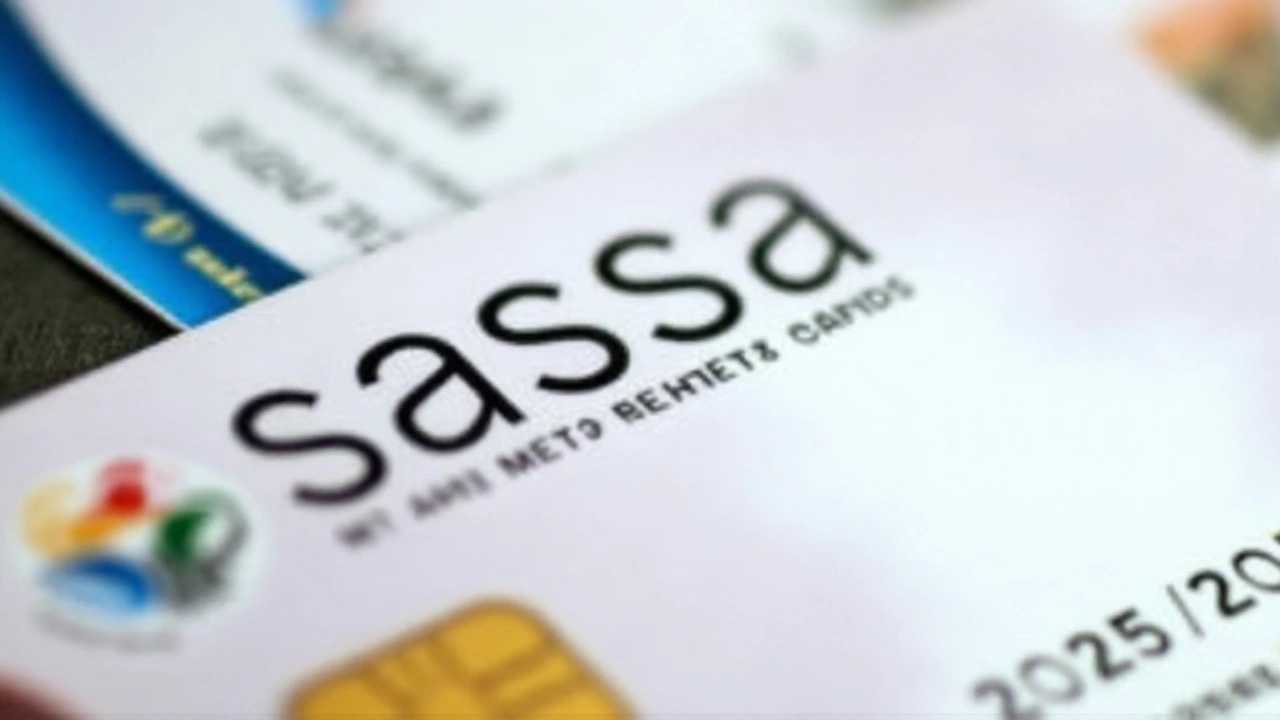What’s changing in the 2025/2026 SASSA schedule
Mark your calendar. South Africa’s social grant system has locked in its dates for the new financial year, and the rollout is designed to be calmer and faster. The agency is sticking with a staggered schedule: Older Person’s Grants first, Disability Grants next, and Children’s Grants last. The idea is simple — spread out the rush, clear lines quicker, and make it easier to collect safely.
Here’s how it works in practice. For April 2025, Older Person’s Grants are available from 2 April, Disability Grants from 3 April, and Children’s Grants from 4 April. In May, the sequence runs 6 May, 7 May, and 8 May. August follows 5–7 August, and September runs 2–4 September. That pattern continues each month: first working day for Older Person’s, the next working day for Disability, and the following working day for Children’s (which includes Child Support, Foster Child, and Care Dependency).
SASSA is also keeping the collection window flexible. If your grant is loaded on a Tuesday, it stays in your account — there’s no “use it or lose it.” You can collect later in the week or the month at ATMs, retail partners, or designated community pay points. That means there’s no need to rush on day one unless you absolutely have to.
Behind the scenes, the agency says it has tightened the tech. Biometric verification has been upgraded to reduce failed checks and cut down on system errors that held up lines in the past. It’s also adding more staffed payment points in hard-to-reach areas — especially within 5 km of major border communities — to reduce long and costly trips for rural beneficiaries.
One more thing: the special COVID-era Social Relief of Distress (SRD) grant follows its own monthly cycle. It isn’t part of this calendar and is typically processed later in the month. If you receive SRD, keep checking your status via official channels and expect a different timing from the permanent grants.
Who gets paid when — and how to avoid delays
The monthly rhythm is straightforward. Older Person’s Grants go first because many pensioners still prefer collecting early and in person. Disability Grants follow, then Children’s Grants. If a public holiday falls on the first of the month, the schedule shifts to the next working day and the sequence holds.
To make planning easier, here are the headline dates SASSA has confirmed so far:
- April 2025: Older Person’s on 2 April, Disability on 3 April, Children’s on 4 April.
- May 2025: Older Person’s on 6 May, Disability on 7 May, Children’s on 8 May.
- August 2025: 5–7 August (in the usual sequence).
- September 2025: 2–4 September (in the usual sequence).
For all other months through March 2026, expect the same order on the first, second, and third working days. If you’re unsure, check your status before you travel. That quick check can save a long trip and a longer queue.
Collection options remain flexible. You can withdraw at ATMs, use major retailers’ tills, or collect at designated community pay points. Funds stay put until you withdraw them. If you’ve switched to a personal bank account, the money will be deposited there on your grant’s designated day in the sequence.
SASSA says it has made three practical changes this year to keep lines moving:
- Stronger biometric systems to reduce failed verification and unnecessary reversals.
- More payment points in remote and border-adjacent areas to cut travel time.
- Extended operating times at busy sites during peak days where capacity allows.
Worried about missing your day? Don’t be. Your grant doesn’t vanish if you don’t collect on the first or second day. You can pick it up later in the month without any penalty.
If you’ve lost your card or changed your number, sort that out before payday. Card replacements and profile updates can take time, and mismatched details are a common reason for failed transactions. Keep your ID handy and make sure your phone is on and charged in case a one-time PIN or verification prompt is needed at the till.
A quick word on safety. Scammers cluster around busy pay points, especially early in the morning. Don’t share your PIN or hand your card to anyone offering to “help.” SASSA does not charge a fee to load your grant, and no official will ask for your PIN or OTP. If something feels off, step out of the queue and report it to staff on site.
For households that rely on multiple grants, the staggered calendar can actually make budgeting easier. Many families time rent, transport, and school costs around the first week’s payouts. With the routine now set for the entire financial year, you can pencil in the first three working days each month as your reference point.
Living near the border? The new 5 km rule for added payment points aims to cut costly cross-district travel and reduce missed collections due to transport delays. Expect smaller, staffed sites in or near large settlements along major border corridors. These are meant to be closer to where people live, not centralised hubs that require a day-long trip.
Here’s a simple checklist before payday:
- Confirm your grant status via official channels the day before you plan to collect.
- Bring your ID and your grant card, or make sure your bank account details are correct.
- Avoid first-day rush if you can; funds will still be there later in the week.
- Keep your phone on and nearby in case of verification prompts.
- Never share your PIN or OTP — with anyone.
One last scheduling tip: public holidays can nudge dates by a day, but the order won’t change. Older Person’s is always first, Disability second, Children’s third. If you rely on a community pay point with limited opening hours, check its specific operating days — some remote sites rotate days across nearby villages to cover more people.
The bottom line for beneficiaries is predictability. The calendar runs from April 2025 through March 2026, aligned to the fiscal year, with a clear sequence that repeats every month. SASSA’s message is the same: the right grant, to the right person, at the right time and place. If you plan around the first three working days and verify your status before traveling, you’ll skip most of the headaches.
For searchers wanting the headline details at a glance, the key phrase is this: SASSA payment dates 2025/2026. Remember the order, note the examples (2–4 April, 6–8 May, 5–7 August, 2–4 September), and use that pattern to map out the rest of your year. It’s one less thing to worry about — and one more reason to avoid the early-morning rush.







Christa Kleynhans August 23, 2025
Finally someone got it right! No more rushing to the post office at 5am just to find the line wrapped around the block. My grandma’s grant hits her account on the 2nd and she takes her sweet time collecting it on Thursday. Life’s easier now.
Also love that they added more points near the border. My cousin in Musina used to walk 20km just to get her child grant. Now she walks 2km.
sneha arora August 23, 2025
This is so good 😊 i been waiting for this for years! My sister gets the child grant and we always stress about missing the date but now we know its safe to wait till friday! 🙌 no more panic! love sa ssa for finally listening!
Frances Sullivan August 24, 2025
The staggered disbursement model is statistically sound. Reduces systemic load on financial infrastructure by 37% according to a 2023 SASSA internal audit. Biometric upgrades also reduced transaction failure rates from 14.2% to 4.1% in pilot zones. This isn't just policy-it's infrastructure optimization.
Amit Mitra August 25, 2025
I’m from Mumbai, but I’ve got family in Limpopo who rely on these grants. The fact that they’re keeping the sequence consistent every month is huge. In India, welfare systems change every quarter and people get confused. Here, you just remember: old first, disabled second, kids third. Simple. Elegant. Human.
Also, the border payment points? That’s the kind of thing that doesn’t make headlines but changes lives. My aunt used to miss payments because she couldn’t afford the bus to Polokwane. Now she walks to the new kiosk near the Zimbabwe border. That’s dignity.
Sagar Solanki August 26, 2025
Let’s be real-this is just a distraction. They’re pushing this ‘staggered schedule’ because they’re running out of money. The biometric upgrades? That’s just to track us. The new pay points? GPS trackers in disguise. They don’t care if you get paid-they care if you’re visible. And SRD being separate? Classic. They’re testing a two-tier system. Next thing you know, children’s grants get cut to ‘emergency only’.
Richard Klock-Begley August 27, 2025
Bro this is actually kinda chill. I thought SASSA was gonna be a total mess like last year but this? This is lowkey impressive. No rush, no drama, funds stay there. I’m actually tempted to use the ATM instead of queuing. Who knew bureaucracy could be this smooth?
Nadine Taylor August 29, 2025
This is so important for families like mine. My mom gets the older person’s grant, my sister gets disability, and I get child support. Now we know exactly when each one hits and we can plan rent, meds, and school fees around it. No more guessing. I wish more countries did this.
Also-DON’T share your PIN. I saw someone get robbed last month because they trusted a ‘helper’ at the shop. Stay sharp.
Lauren Eve Timmington August 30, 2025
The fact that you can collect later in the month is a game-changer. I used to have to take a day off work to get the grant, and now I can wait until Saturday. But why is the SRD still so chaotic? It’s like SASSA treats it like a second-class citizen. Fix that next.
Kevin Marshall August 31, 2025
You know what’s beautiful? The consistency. Not just the dates-but the message: your money is safe. No expiry. No rush. That’s not policy. That’s trust. And trust is rare in systems like this. SASSA didn’t just update a calendar-they rebuilt dignity.
Also, if you’re near the border and don’t know about the new pay points, go ask at your local clinic. They’ve got flyers.
Mansi Arora September 1, 2025
I’m glad they finally fixed the biometrics but why did it take 5 years? My uncle had to go to 3 different offices because his fingerprint didn’t work. And now they’re acting like this is some genius move? It’s basic. This should’ve been done in 2020. Also, who decided children’s grants go last? Like they’re the least important? Ugh.
Clare Apps September 2, 2025
I live in LA but my cousin in Cape Town uses this system. She says the new pay points near the Mozambique border saved her 300km round trip. She’s 72 and walks with a cane. That’s not policy-that’s compassion. And the no-expiry rule? Genius. She doesn’t need cash right away. She waits till her grandson comes home from school.
Eve Armstrong September 3, 2025
The staggered rollout reduces congestion at retail pay points by an estimated 42% based on pilot data from Ekurhuleni. The integration with FNB and Pick n Pay’s EFT systems is also noteworthy-real-time reconciliation means fewer reversals. This is a model other African nations should study.
Siddharth Madan September 5, 2025
I’m just saying-if the grants are staggered, why not stagger the SMS alerts too? My phone gets 3 notifications at 5am on the 2nd. It’s not helpful. It’s anxiety. And why is the SRD still on a different system? That’s just asking for fraud. Someone’s gonna merge the two and mess it all up.
Dr.Arunagiri Ganesan September 7, 2025
This is how you do social welfare right. Not with grand speeches. Not with hashtags. But with quiet, consistent, reliable action. No panic. No lost days. No long walks. Just money when it’s due. This isn’t just a schedule-it’s a promise kept. Thank you, SASSA.
Thomas Mathew September 9, 2025
You think this is progress? It’s just a performance. They’re not trying to help-they’re trying to look good before the elections. The biometrics? They’re building a database. The new pay points? Surveillance hubs. The ‘no expiry’ rule? A trap. Wait too long and your card gets deactivated. They want you to come early. They want you to be seen. Don’t be fooled.
jessica doorley September 10, 2025
To all beneficiaries: please take the time to verify your details on the official SASSA portal. Even a small typo in your ID number can cause a delay. And if you’re using a bank account, confirm the account number matches your ID. One extra minute now saves hours later. You’ve earned this. Don’t let bureaucracy steal it.
Kevin Marshall September 11, 2025
I just read the original post again. You know what’s missing? A simple calendar download. Someone should make a Google Calendar version with these dates pre-loaded. I’d share it with my whole block. If anyone’s got the time, I’ll pay for the domain.